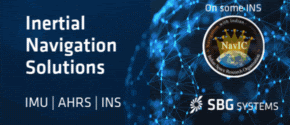| His Coordinates, Interviews | |
Applications relying on position, velocity and timing information will grow
 |
|
IFEN is pushing the boundary in satellite navigation’- How would you explain this?
Founded in 1998, IFEN is recognised as a forerunner in several satellite navigation technologies and respected for defining industry standards.
IFEN was the first company in Europe to work on ground based integrity monitoring. Starting out with research and development in 1999 for regional augmentation system EGNOS V1, IFEN is currently providing maintenance to the current SoL certified EGNOS V2 for the integrity check. Furthermore, IFEN will continue to make major contributions to the ongoing definition of the next generation EGNOS V3.
Since 2000 IFEN has been heavily involved in the design and implementation of Galileo global integrity. Of special remark, IFEN invented the new concept of Memory Codes in 2003, used today for Galileo E1 and E6 signals. Additionally IFEN is the only European provider of the verification receivers for the Galileo payload test system and the provider of the Galileo UERE monitoring facility. What’s more the worldwide first Galileo test range GATE in Berchtesgaden, Germany was designed and developed by IFEN, acting since 2010 also as system operator of GATE.
IFEN also offers a comprehensive range of outstanding GNSS test solutions for the commercial market, focusing on flexible multi-GNSS and multi-frequency RF signal generators with leading-edge support for up to nine RF frequencies and 108 signal channels and also offers flexible and customizable multi-GNSS and multi-frequency test receivers.
These important milestones represent our company vision, which is to push past all the boundaries of today’s technology standards to deliver unrivalled excellence in satellite navigation for all working results, products or services. Our ambitions are challenging but pushing the boundary is our ‘self image’.
What could be the key drivers for navigation market?
With respect to the navigation market, today we are living in exciting and challenging times. The key drivers for the navigation market today and in future are in our opinion twofold. They are application based on one hand and technology driven on the other.
Application based means that the number of applications relying on position, velocity and timing (PVT) information will grow permanently in future. Many applications are already using this information today, predominantly derived from worldwide available satellite navigation systems. The growing number of applications demanding such PVT information even under challenging environmental conditions, such as in inner cities, in urban canyons or indoors, will in future also affect and most likely change the technical requirements of the user equipment (GNSS receivers or more generally GNSS positioning sensors).Furthermore, at minimum this will influence the usage requirements of the global satellite navigation systems.
From a technology point of view, the navigation market starts changing already today from the usage of a single satellite navigation system, primarily GPS, towards the usage of multiple satellite navigation systems, called multi-GNSSs (Global Navigation Satellite Systems). Examples are the combined use of GPS and GLONASS already today in the consumer market (e.g. in smart phones and for car navigation) and the usage of multi-GNSS (e.g. GPS + GLONASS + Galileo + SBAS + QZSS), combined with multi-frequency, in the professional market. Additionally in the future it is foreseeable that the use of dual-frequency equipment in the consumer market will also be in demand.
Last but not least, both of these key drivers for the navigation market will at the end of the day also affect the testing requirements for GNSS receivers and positioning sensors and finally the testing needs for GNSS based applications. IFEN will be prepared for this future challenge by providing a complete portfolio of leading-edge GNSS test solutions.
Would you like to tell us something about your joint venture with ‘WORK Microwave’ in the context of NavX®-GNSS test solution?
IFEN’s primary commercial products line ‘NavX® – GNSS Test Solutions’ is designed to provide the users with a complete range of integrated navigation test products and services unique on the market, which surpass the performance of standard satellite navigation. To be able to do justice to this claim, we were very glad that we could find with WORK Microwave, a leading European manufacturer of advanced satellite communications equipment, a reliable partner who has in-depth expertise in RF design and manufacturing.
Based on IFEN’s outstanding satellite navigation and GNSS signal design knowhow and experience, gathered in the frame of its participation in the European EGNOS and Galileo programs, IFEN decided in 2005 to step into the commercial GNSS RF signal simulator market. For this venture RF expertise was essential for the market success and this was the reason for the birth of our partnership with WORK Microwave, which to this day has been a very successful partnership, supported greatly by the local proximity of both partners in Germany.
Today, IFEN produces its NavX®-NCS (Navigation Constellation Simulator) range of commercial multi-GNSS RF signal simulators in partnership with WORK Microwave for already nearly six years.
With the NavX®-NCS series, we provide the first GNSS RF signal generators in the world capable of simulating GPS, Galileo, GLONASS, QZSS and SBAS simultaneously in a single chassis. They are the only GNSS simulators in the market today offering both flexibility and scalability with full multiconstellation and multi-frequency capability. The NavX®-NCS series of GNSS RF signal generators offered by IFEN in partnership with WORK Microwave therefore sets a“new standard” for GNSS RF signal simulation.
GATE closes the gap between laboratory based constellation simulations and the real-world Galileo system. Please elaborate?
The development of products, services and applications is a key factor for the commercial success of a satellite navigation system. This was the basic thought behind the idea of setting up an open-air test infrastructure also for Galileo. A similar approach has already been followed by GPS with the setting up of the initial YUMA test bed decades ago in the late 1970’s. The initial idea the development and setting up of the Galileo Test and Development Environment – GATE is based on, is related to the problem that by the natural physical restrictions of the laboratory based constellation simulators limits are set to the realistic simulation of multipath and interference effects. Yet it is these effects caused by environmental conditions, such as for inner cities, for urban canyons or for indoor scenarios, and deteriorating the GNSS signals that are becoming more and more the dominant navigation errors. Especially in the case when the more dominant ionospheric error can significantly be reduced by using multi-frequency GNSS receivers.
With GATE, a unique outdoor open-air test range is available for the emerging Galileo and GPS satellite navigation market, enabling tests under realistic environmental signal effects and dynamic conditions, including multipath and interference effects. Consisting today of eight virtual „Galileo satellites“ located on top of several mountains around the GATE test area in Berchtesgaden (Germany), a well suited topology is available to support different testing scenarios. With full control over the eight GATE “Galileo satellites”, feared events can be simulated enabling also the evaluation of new user integrity (RAIM) algorithmic concepts and implementations. GATE therefore closes the gap between laboratory based constellation simulations and the real-world Galileo system, with its 18 satellites IOC constellation planned to be available in 2014.
How do you see your association with IRNSS?
In our opinion the Indian Regional Navigation Satellite System (IRNSS) will be in future an essential component of the worldwide satellite navigation infrastructure and will therefore play an important role for India and for Asia as well. In this context, IFEN is proud that the IRNSS payload system engineering group of the Space Applications Centre (SAC) in Ahmedabad, India, has selected IFEN’s multiconstellation and multi-frequency GNSS RF simulator NavX®-NCS Professional in 2011 for their R&D and testing activities in the frame of the ongoing IRNSS programme. The decision of the Space Application Centre for our GNSS RF Navigation Constellation Simulator NavX®-NCS as a reference in the official IRNSS space program of the Indian government represents another milestone for our ‘NavX® – GNSS Test Solutions’ products and perfectly matches to IFEN’s mission of pushing the boundary in satellite navigation.
What is your preparation for a muti-GNSS scenario?
We have recognized very early on that the future with satellite navigation will lie in multi-GNSS applications. We have walked along this path consistently from the beginning. This is not only reflected in our extensive satellite navigation expertise but also found in the philosophy of all of our products. Today IFEN is known for its outstanding multi-GNSS satellite navigation knowhow offered to customers for services and due to its multi-GNSS technology portfolio, IFEN is already positioned as a provider of leading-edge multi-GNSS test solutions for the commercial market
Our Vision – The future is multi-GNSS – The future is now! Our Mission – ‘Pushing the Boundary’ in multi-GNSS functionality and performance.
What are other application areas your product is suitable for other than GNSS?
IFEN’s commercial products line ‘NavX® – GNSS Test Solutions’ is primarily addressing the consumer and professional application areas. For the consumer application area we are focusing with our NavX®-NCS series of GNSS RF signal generators especially on the automotive, personal navigation, mobile phone, chipset manufacturer, and telecommunications market segments. Within the professional application area we are mainly addressing with our NavX®-NCS series of GNSS RF signal generators the professional receiver manufacturer, precision agriculture, civil engineering, civil aviation, space, defence and scientific market segments.












 (5 votes, average: 1.20 out of 5)
(5 votes, average: 1.20 out of 5)





Leave your response!